“It is indeed our common mission, through our different charisms, to restore in humanity and the entire creation the values bestowed to them from the day they were created,” they say.
In her presentation Tuesday, August 24, the President of ACWECA underscored the prophetic role of Catholic Sisters who she says are supposed to hear the cry of the less privileged and marginalized.
“In society today, religious women need to be the voices of the poor people of today. In the Old Testament, the poor were the widows, the orphans and the strangers/foreigners. Even today, the widows, orphans, refugees remain among the poorest people,” Sr. Njeri says in the presentation obtained by ACI Africa.
She posits, “Some of the cultural practices in some societies today continue to marginalize the orphans and widows. Women Religious, do we hear their cry?”
The Kenyan-born Sister who is the Superior General of the Little Sisters of St. Francis (LSOSF) notes that even as the society continues to develop, more people remain poor for various reasons.
(Story continues below)
She gives the example of women and girls who are trafficked, men drowning in the seas looking for greener pastures abroad, victims of abuse of every kind as some of the vulnerable groups that continue to suffer.
Others are women who have suffered from genital mutilation as well as women disempowered due to questionable cultural practices.
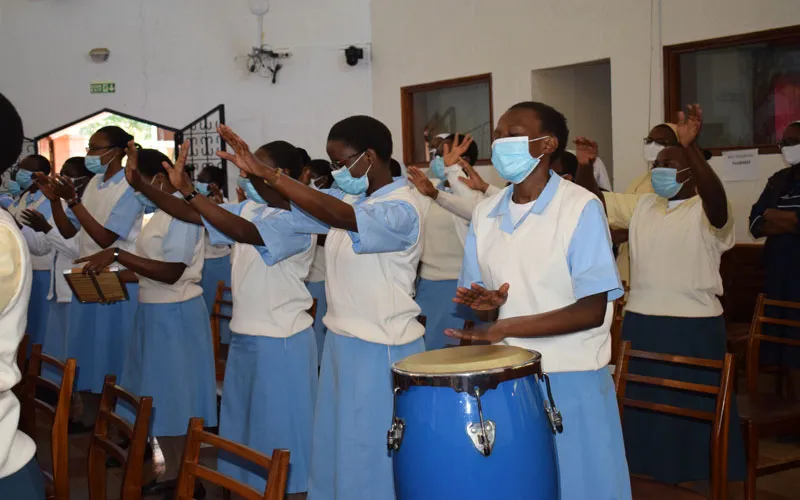 Credit:ACWECA
Credit:ACWECA
The ACWECA President says that women Religious cannot remain indifferent to such people, adding, “The invitation remains relevant – to move to the margins, to meet with these people, to listen to them and like the prophets, to give them a voice, to become part of their process of liberation.”
“Just as the Canaanite woman persevered and never gave up in interceding for her daughter’s healing, so is the call to religious women to continue intervening in the lives of these marginalized people until something good happens,” she says.
Religious Sisters, she continues, are invited to live their lives in such a way that they show that there is a possibility of human relationships that are life-giving and healthy.
Sr. Njeri finds it unfortunate that instead of embracing healthy relationships with everyone, some Religious Sisters are easily swayed according to their various tribal affiliations.
“In some cases, though, the Religious allow themselves to be divided along tribal lines. This becomes a counter witness since they are invited to a way of life that witnesses to the value of unity and to transcend divisions caused by tribal and other cultural differences,” she says.
The Kenyan Sister further describes Religious women as people expected to be consumed by the love of God and who witness to the unending love of God. “This can only happen if they are first and foremost filled with love. After that, one is able to love others in the same way,” she says.
“When one experiences how God loves her unconditionally, she too will strive to love as much as they can even those they find it difficult to love. One is able to transcend and like Jesus, wash the feet of his betrayer Judas,” Sr. Njeri says.
According to ACWECA President, women Religious “experience themselves as wounded people who need healing and a return to God.”
“If Religious women can truly embrace healing and reconciliation as part and parcel of their lives, they become a prophetic sign of the need to do the same for the wounded and fragmented world of today,” she says, and adds, “Lamentations 3:22 reminds us that the mercies of the Lord are new every morning. It is this affirmation that gives every religious woman the courage to heal and start anew.”
In his keynote address to the participants of the blended virtual and physical Plenary Assembly, the Prefect of the Congregation for Institutes of Consecrated Life and Societies of Apostolic Life, Joáo Cardinal Braz de Aviz, lauded the theme of the ACWECA Plenary Assembly, noting that the world needs a prophetic voice amid the challenges that people are facing.
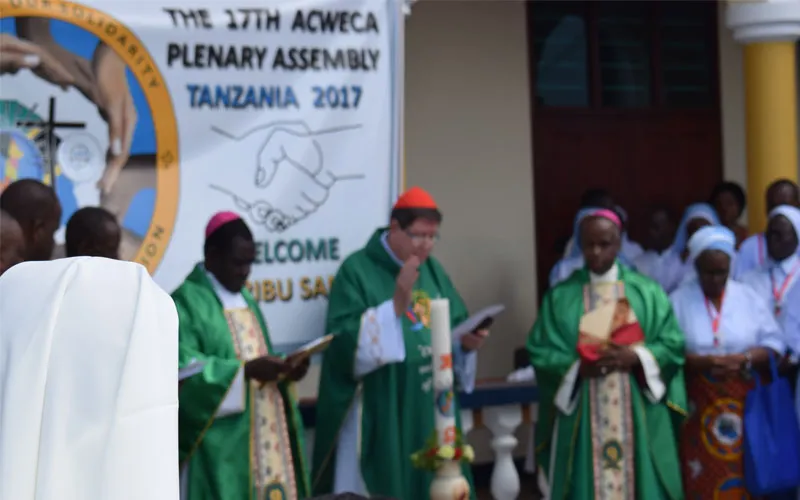 Cardinal Aviz, as he prepared for the procession for the opening Holy Mass at the 17th ACWECA Plenary Assembly which took place in 2017 in Dar es Salaam, Tanzania. Credit: ACWECA
Cardinal Aviz, as he prepared for the procession for the opening Holy Mass at the 17th ACWECA Plenary Assembly which took place in 2017 in Dar es Salaam, Tanzania. Credit: ACWECA
“In this time, broken by the COVID-19 pandemic, we need a prophetic response from religious life that helps us to recognize the presence of God in the history of our people,” Cardinal Braz de Aviz said on the first day of the Plenary Assembly, Monday, August 23.
The Vatican-based Cardinal added, “We need to contemplate how God intervenes for our good in the present situation and indicates the way ahead for the future… An Assembly like this is the right place to ask what prophecy we can offer our sisters and brothers at this historic moment.”
The Cardinal commended Catholic Sisters in the Eastern and Central Africa for their efforts to reach those who have been marginalized by the pandemic in the region.
“As ACWECA, you seek in this Assembly to share these dreams that are nourished by prophecy. You are already awakening your prophecy, especially as you approach the pain of your people and seek to project and share new ways of making yourself close to the most marginalized people in this society affected by the pandemic,” he said.
The native of Portugal called upon ACWECA members to align their charisms to the concerns of the people during the pandemic.
The time of the pandemic, Cardinal Braz de Aviz said, is also the time to find ways to strengthen the testimony of African religious life across the continent.
He urged members of ACWECA to channel their efforts into strengthening the broader Confederation of Major Superiors of Africa and Madagascar (COMSAM).
“I believe that it is very important to join the journey together with all the African National Conferences grouped in COSMAM / COMSAM because with your experience, with the path you have made over the years and with the strength of your vision of consecrated women, you can give a great contribution to the mission of COSMAM / COMSAM,” he said, and added, “By joining forces, the holistic transformation you dream of for the whole region will be extended to the whole continent.”
The role of COMSAM, a confederation of various National Conferences, is to animate the conferences “without replacing them,” the Cardinal explained.
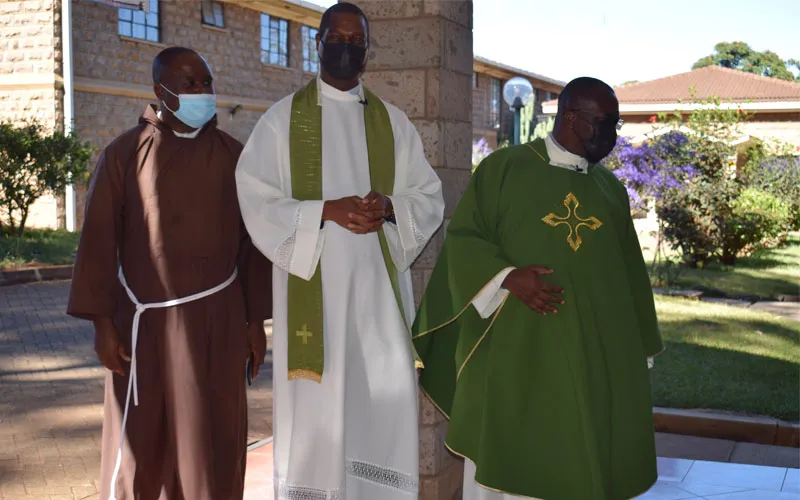 Credit: ACWECA
Credit: ACWECA
He added, in reference to the uniting forum, “It is concerned with accompanying and encouraging these organizations of communion and action. It has always invited them to share the strengths of the different locations, according to the diverse territories and situations.”
“We hope that this process will soon be set in motion in response to the Holy Father’s invitation to dream together and that synodality will help you walk together,” he said.
The Rome-based Prefect of the Congregation for Institutes of Consecrated Life and Societies of Apostolic Life expressed optimism that the 18th ACWECA Plenary Assembly would ignite the spirit of the Blessed Virgin Mary in the members.
“I hope that during this meeting the prophecy will awaken in all of you, in the style of Mary. The Woman of the Spirit, with a deep look and a bold and grateful voice; the Woman of proximity and closeness; Mother and Sister of all humanity, especially of the little ones, of those who are hungry for bread, dignity, justice and peace,” Cardinal Braz de Aviz said August 23.
Agnes Aineah is a Kenyan journalist with a background in digital and newspaper reporting. She holds a Master of Arts in Digital Journalism from the Aga Khan University, Graduate School of Media and Communications and a Bachelor's Degree in Linguistics, Media and Communications from Kenya's Moi University. Agnes currently serves as a journalist for ACI Africa.




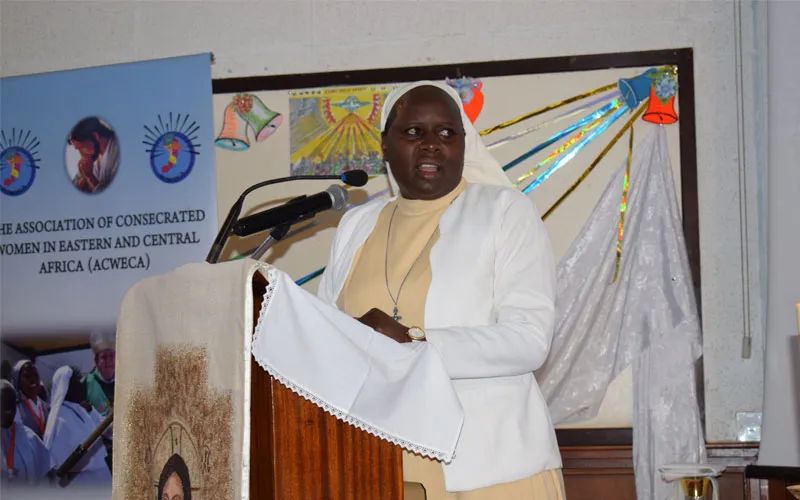 Credit:ACWECA
Credit:ACWECA
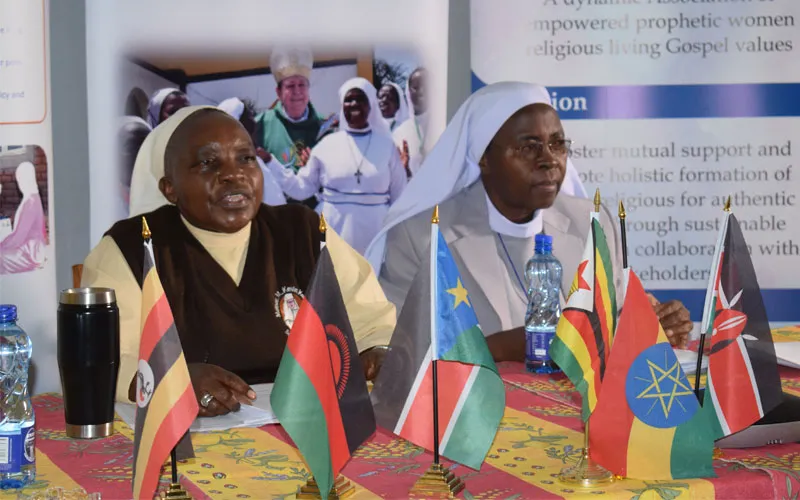 ACWECA President (right), Sr. Cecilia Njeri and the ACWECA Secretary General (left) Sr. Hellen Bandiho. Credit: ACWECA
ACWECA President (right), Sr. Cecilia Njeri and the ACWECA Secretary General (left) Sr. Hellen Bandiho. Credit: ACWECA Credit:ACWECA
Credit:ACWECA Cardinal Aviz, as he prepared for the procession for the opening Holy Mass at the 17th ACWECA Plenary Assembly which took place in 2017 in Dar es Salaam, Tanzania. Credit: ACWECA
Cardinal Aviz, as he prepared for the procession for the opening Holy Mass at the 17th ACWECA Plenary Assembly which took place in 2017 in Dar es Salaam, Tanzania. Credit: ACWECA Credit: ACWECA
Credit: ACWECA


